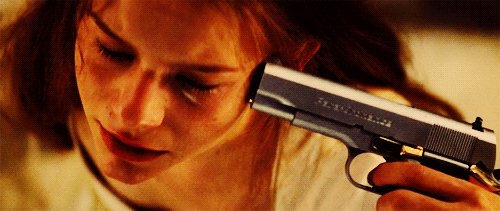
As it has been seen very painfully lately in TV, the best story, with the most excellent buildup and most powerful cast of characters will just collapse if the ending isn't good enough.
A technically happy ending that isn't good enough is not going to cut it- again, as we painfully realised. 
(I ask myself sometimes if I will ever stop using GoT as an example to be avoided while taking shots at it. Probably never, that kind of disaster is once every fifty years]
But what is a proper ending?
It can be good.
It can be bad.
It can be ambiguous. 
Or it can be bittersweet or with a saving grace. 
A proper ending isn't defined by what it is. Rather, by how it is delivered, and how much it conforms to three simple principles:
A. Be a coherent and reasonable result for the characters' arcs as presented through the story
As it's been said many times, every character that is even rudimentary in design, follows a specific character arc throughout the story- in short, gets from point A to point B when it comes to changing in personality or behavior or ideas. His/her reactions change with that- so an ending has to appear consistent with the characters' development through the story. Even when there are twist endings, the characters still remain consistent to their own self, personality and development. Proper twists, after all, are set up way before they are revealed.
B. Be a coherent and reasonable ending to the plot as it developed through the story
The story is by nature a domino, with its tiles falling one after the other until none remain standing. That means, that one tile has to push down the next as it falls: one event in the story has to lead to another. It might have twists and turns, but the sequence in the tiles will never be broken up until the very last one, the ending, falls. The ending that comes as a result of the entire story's buildup is an ending that might not be what the audience hopes for, but it will definitely be one that the audience can be convinced plausibly happened to the characters.
C. Be consistent with the theme and message of the story
This, in my opinion, is the part where somehow lately stories drop the ball. Every story, no matter how innocuous, has a theme or a message. From ‘obsession is bad and makes you look silly’ that the Roadrunner cartoon taught us to how ‘corruption happens gradually and if you don’t watch it, you'll wake up a monster' that 1981's Mephisto suggested. If the ending (good or bad) doesn't serve that theme, then the story feels incomplete or even disingenuous. Sometimes only a good or only a bad ending (in terms of how happy it leaves the cast) can serve the theme. In that case we should let it happen even if we prefer the alternative that might not drive the theme through completely, and thus create a lesser story after all.
In my opinion there are no exceptions to this three-way obligation for a story's conclusion. It doesn't matter what kind of story it is, how comedic or how dramatic, for children or for adults. It still will develop in ways that will only make a very specific selection of endings proper for it. As creators, it is something we should respect, even when the audience sees it coming.
(aka, don't subvert expectations because you want to stick it to your audience)
What do you think?
Don’t forget you can now advertise on DrunkDuck for just $2 in whichever ad spot you like! The money goes straight into running the site. Want to know more? Click this link here! Or, if you want to help us keep the lights on you can sponsor us on Patreon. Every bit helps us!
Special thanks to our patrons!!

Justnopoint - Banes - Rmccool - Abt Nihil - Phoenixignis - Gunwallace - Cresc - Pauleberhardt - Scruff - Dragonaur - Emma Clare - Dylandrawsdraws - Functioncreep - Eustacheus - Dillycomics - Barrycorbett - Sinjinsoku - Smkinoshita - Jerrie - Chickfighter - Andreas_Helixfinger
Tantz Aerine - Cdmalcolm1 - Epic Saveroom - Spacewitch

Sticking the Landing
Tantz_Aerine at 12:00AM, Sept. 14, 2019
6 likes!


©2011 WOWIO, Inc. All Rights Reserved Mastodon





skyangel at 5:28PM, Sept. 18, 2019
I've never had any trouble writing endings for my stories as I always have at least one favourite idea planned from the start which tends to alter and bend with the wind as the rest of the story progresses. My only conflict is wondering if my preferred ending is going to satisfy the readers enough or leave them disappointed and that does tend to make me wrestle with my decision but most people tend to advise you write what you want to read so I figure if it is the ending I always wanted at least I feel passionate enough to protect it. Very interesting article though and certainly plenty to think about here!
bravo1102 at 10:54AM, Sept. 14, 2019
If you try an exception you as a writer are doing yourself and your audience a great disservice. It can be a surprise or a twist and still fit the three criteria. If it doesn't fit the audience will always know and you'll find yourself rationalizing in all kinds of directions. Sometimes it may need an explanation like the Planet of the Apes remake or the whole I see dead people DVD end featurettes explaining how everything was in the films all along. Don't be afraid to play with different endings and see how each fits. At least three of my comics had multiple variant endings written and two included them at the end to give a glimpse at how I come up with all this stuff. And many times the ending I have in mind at the beginning is not the one I end up using because a better one suggests itself during the creative process. Remember I have five completed comics plus a few shorter pieces. I've done endings.
ShaRose49 at 9:30AM, Sept. 14, 2019
I agree with what you’re saying here, and I’m grateful that some people understand that to some things there really are no exceptions. This article actually makes me feel better about my ending to this episode, especially the bit about dominoes. I often feel like it takes me too long to get from point A to point B, but better that it takes awhile than for it not to have a proper buildup
bravo1102 at 5:11AM, Sept. 14, 2019
I'm very much in accord with @usedbooks, though the ending of "Into the Woods" was presented better in the play. I grew up in the 1970s when everything was about subverting expectations so most endings were unsatisfying. Might be part of the reason I latched onto watching old movies (in addition to me mom and grandma both being avid moviegoers). I don't have too many problems with an ending if I can see how the story led up to it. I habitually predict endings often with great accuracy so if I get a "mindf*ck" without warning it better gave some logic behind it even if not totally satisfying.
usedbooks at 4:55AM, Sept. 14, 2019
Also, if a story leaves loose ends, it drives me nuts. They should at least address them. (Vignettes during the credits have helped with that in many cases.)
usedbooks at 4:54AM, Sept. 14, 2019
I have a scale of success for a story ending. If I leave a theater (or finish a book or video game) thinking/talking about the ending I would have written, it failed. If they used an ending I would have written, it was a medium success. If they came up with an ending that surpassed what I had in mind, it was exceptional. Usually only that last category are stories I'm excited to watch/read/play again.
marcorossi at 4:16AM, Sept. 14, 2019
SEGUE... So in practice Daniel's growth story is an explicitation of a moral story, the answer to the question: "How can I become a strong grown adult male without being an axehole?" This moral question is really the backbone of the whole movie, and is, so to speak, structural. So an ending that doesn't deliver on the "moral question" doesn't really work, and this isn't just a matter of tastes, but rather a structural problem: all the plot rotates around this question, so you can't not answer it. But in recent times the idea that stories have a moral sound old fashioned (mostly because people conlate having a moral with having a standard morality), so many writers forget this, that in my opinion is a really basic thing.
marcorossi at 4:11AM, Sept. 14, 2019
In my view, the problem is that most stories are actually moral questions, so the ending has to be a satisfactory answer to the moral question. This is consistent with the common theme of personal development in a story, that implies a moral judgement. For example, take the Karate Kid (old one since I didn't see the new one): Daniel is a young teen male who is bullied at school in front of his flame. He therefore wants to become strong. Being "strong" is a part of male gender identity, and Daniel is therefore in search of some role model, and the only one he can find are the axehole Cobra Kai guys, a bunch of bullies. But then he finds another role model, Miyagi, who teach him that "strenght" doesn't lie in being an axehole or a bully, but rather in self discipline. Stuff happens, until daniel at the end defeats the Cobra Kai guys with a move that symbolizes the time spent doing karate katas (hence his self discipline). SEGUE...
usedbooks at 3:53AM, Sept. 14, 2019
Best example of "dropped ball" I can think of is "Into the Woods." Most of my family emerged from that movie hating it because most of my family are tragedy-averse, and it's not a pleasant ending. But it wasn't supposed to be. The message of the story was powerful. It was one of loss and survival. The character's lost their most significant connection and had to form new bonds to each other. Fine. But for me, the ending failed because they ruined the consistency of that message by killing off a "survivor of loss," the mother of the giant. To have the impact of the story message, she should have been a grieving survivor too. The fact that the message was consistent through every arc except the giant's destroyed the impact for me.
Gunwallace at 2:54AM, Sept. 14, 2019
Good advice